- CLASSIC MAGAZINES
- REVIEW CREW
A show recapping what critics thought back
when classic games first came out! - NEXT GENERATION'S BEST & WORST
From the worst 1-star reviews to the best
5-stars can offer, this is Next Generation! - NINTENDO POWER (ARCHIVE)
Experience a variety of shows looking at the
often baffling history of Nintendo Power! - MAGAZINE RETROSPECTIVE
We're looking at the absolutely true history of
some of the most iconic game magazines ever! - SUPER PLAY'S TOP 600
The longest and most ambitious Super NES
countdown on the internet! - THEY SAID WHAT?
Debunking predictions and gossip found
in classic video game magazines! - NEXT GENERATION UNCOVERED
Cyril is back in this spin-off series, featuring the
cover critic review the art of Next Generation! - HARDCORE GAMER MAGAZING (PDF ISSUES)
Download all 36 issues of Hardcore Gamer
Magazine and relive the fun in PDF form!
- REVIEW CREW
- ELECTRONIC GAMING MONTHLY
- ELECTRONIC GAMING MONTHLY RANKS
From Mario to Sonic to Street Fighter, EGM
ranks classic game franchises and consoles! - ELECTRONIC GAMING MONTHLY BEST & WORST
Counting down EGM’s best and worst reviews
going year by year, from 1989 – 2009! - ELECTRONIC GAMING BEST & WORST AWARDS
11-part video series chronicling the ups and
downs of EGM’s Best & Worst Awards!
- ELECTRONIC GAMING MONTHLY RANKS
- GAME HISTORY
- GAME OVER: STORY BREAKDOWNS
Long-running series breaking down game
stories and analyzing their endings! - A BRIEF HISTORY OF GAMING w/ [NAME HERE]
Real history presented in a fun and pithy
format from a variety of game historians! - THE BLACK SHEEP
A series looking back at the black sheep
entries in popular game franchises! - INSTANT EXPERT
Everything you could possibly want to know
about a wide variety of gaming topics! - FREEZE FRAME
When something familiar happens in the games
industry, we're there to take a picture! - I'VE GOT YOUR NUMBER
Learn real video game history through a series
of number-themed episodes, starting at zero! - GREAT MOMENTS IN BAD ACTING
A joyous celebration of some of gaming's
absolute worst voice acting!
- GAME OVER: STORY BREAKDOWNS
- POPULAR SHOWS
- DG NEWS w/ LORNE RISELEY
Newsman Lorne Riseley hosts a regular
series looking at the hottest gaming news! - REVIEW REWIND
Cyril replays a game he reviewed 10+ years
ago to see if he got it right or wrong! - ON-RUNNING FEUDS
Defunct Games' longest-running show, with
editorials, observations and other fun oddities! - DEFUNCT GAMES QUIZ (ARCHIVE)
From online quizzes to game shows, we're
putting your video game knowledge to the test!- QUIZ: ONLINE PASS
Take a weekly quiz to see how well you know
the news and current gaming events! - QUIZ: KNOW THE GAME
One-on-one quiz show where contestants
find out if they actually know classic games! - QUIZ: THE LEADERBOARD
Can you guess the game based on the classic
review? Find out with The Leaderboard!
- QUIZ: ONLINE PASS
- DEFUNCT GAMES VS.
Cyril and the Defunct Games staff isn't afraid
to choose their favorite games and more! - CYRIL READS WORLDS OF POWER
Defunct Games recreates classic game
novelizations through the audio book format!
- DG NEWS w/ LORNE RISELEY
- COMEDY
- GAME EXPECTANCY
How long will your favorite hero live? We crunch
the numbers in this series about dying! - VIDEO GAME ADVICE
Famous game characters answer real personal
advice questions with a humorous slant! - FAKE GAMES: GUERILLA SCRAPBOOK
A long-running series about fake games and
the people who love them (covers included)! - WORST GAME EVER
A contest that attempts to create the worst
video game ever made, complete with covers! - LEVEL 1 STORIES
Literature based on the first stages of some
of your favorite classic video games! - THE COVER CRITIC
One of Defunct Games' earliest shows, Cover
Critic digs up some of the worst box art ever! - COMMERCIAL BREAK
Take a trip through some of the best and
worst video game advertisements of all time! - COMIC BOOK MODS
You've never seen comics like this before.
A curious mix of rewritten video game comics!
- GAME EXPECTANCY
- SERIES ARCHIVE
- NINTENDO SWITCH ONLINE ARCHIVE
A regularly-updated list of every Nintendo
Switch Online release, plus links to review! - PLAYSTATION PLUS CLASSIC ARCHIVE
A comprehensive list of every PlayStation
Plus classic release, including links! - RETRO-BIT PUBLISHING ARCHIVE
A regularly-updated list of every Retro-Bit
game released! - REVIEW MARATHONS w/ ADAM WALLACE
Join critic Adam Wallace as he takes us on a
classic review marathon with different themes!- DEFUNCT GAMES GOLF CLUB
Adam Wallace takes to the links to slice his way
through 72 classic golf game reviews! - 007 IN PIXELS
Adam Wallace takes on the world's greatest spy
as he reviews 15 weeks of James Bond games! - A SALUTE TO VAMPIRES
Adam Wallace is sinking his teeth into a series
covering Castlevania, BloodRayne and more! - CAPCOM'S CURSE
Adam Wallace is celebrating 13 days of Halloween
with a line-up of Capcom's scariest games! - THE FALL OF SUPERMAN
Adam Wallace is a man of steel for playing
some of the absolute worst Superman games! - THE 31 GAMES OF HALLOWEEN
Adam Wallace spends every day of October afraid
as he reviews some of the scariest games ever! - 12 WEEKS OF STAR TREK
Adam Wallace boldly goes where no critic has
gone before in this Star Trek marathon!
- DEFUNCT GAMES GOLF CLUB
- DAYS OF CHRISTMAS (ARCHIVE)
Annual holiday series with themed-episodes
that date all the way back to 2001!- 2015: 30 Ridiculous Retro Rumors
- 2014: 29 Magazines of Christmas
- 2013: 29 Questionable Power-Ups of Christmas
- 2012: 34 Theme Songs of Christmas
- 2011: 32 Game Endings of Christmas
- 2010: 31 Bonus Levels of Christmas
- 2009: 30 Genres of Christmas
- 2008: 29 Controls of Christmas
- 2007: 34 Cliches of Christmas
- 2006: 33 Consoles of Christmas
- 2005: 32 Articles of Christmas
- 2004: 31 Websites of Christmas
- 2003: 29 Issues of Christmas
- 2002: 28 Years of Christmas
- 2001: 33 Days of Christmas
- NINTENDO SWITCH ONLINE ARCHIVE
- REVIEW ARCHIVE
- FULL ARCHIVE
Lightning Returns: Final Fantasy XIII
Previously on Final Fantasy XIII: Lightning fights the fal'Cie to rescue her sister and break the mark of the I'Cie. Along the way she meets up with a group of unlikely allies, who band together to save the Cocoon from being destroyed. And then, out of nowhere, the whole thing turns into Back to the Future and introduces time travel. All this leads us to Lightning Returns: Final Fantasy XIII, the exciting (and convoluted) final chapter in the Nova Chrysalia trilogy.
For all the preamble, Lightning Returns has a surprisingly simple story that is quick and easy to summarize. You play as Lightning, who returns to Nova Chrysalia thirteen days before its prophesized destruction. She has been named the Savior by God Bhunivelze and is on a mission to save the souls of humanity from the burdens on their hearts, guiding them to a new world. She is driven by her desire to bring back Serah, the sister that started the domino effect some 500 years ago.
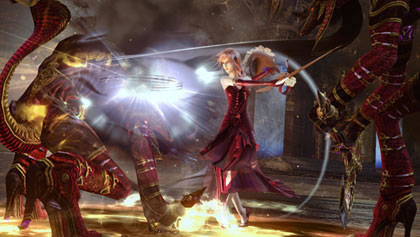 Click For the Full Picture Archive
Click For the Full Picture ArchiveObviously, there's more to it than I'm letting on. Beyond saving the souls of humanity, Lightning will use the final thirteen days to track down former Final Fantasy XIII cast members, such as Vanille, Sazh, Snow and more. On top of that, she's being guided by a youthful Hope and stalked by a mysterious girl named Lumina. It's a juggling act to not only save as many souls as possible, but also make sure all the pieces are in place for the final day. Being a servant of God can be incredibly stressful.
There's a reason I keep mentioning that these are the final thirteen days before the end of the world, and that's because time plays an important part in Final Fantasy XIII-3. With the exception of cinema scenes and fighting, the clock is always ticking down for Nova Chrysalia. Lightning is able to buy a few days by simply saving enough souls, but there's nothing she can do about the world coming to an end.
With the clock always ticking, Lightning's final chapter feels more like a Dead Rising game than Final Fantasy sequel. Many missions are time sensitive. Not just when it comes to completing them, but also when it comes to interacting with the quest givers. Forget fighting scary monsters, Lightning's biggest enemy is time management.
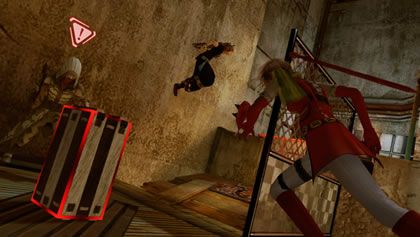 Click For the Full Picture Archive
Click For the Full Picture ArchiveThe different quests are split up across four unique regions, each with its own lengthy story mission to complete. We start in Luxerion, which is a quiet town with a very concerning crime problem. When bored of the small town, Lightning can hop on the train and visit Yusnaan, a large party city full of fireworks, staged fights and armed guards on the lookout for a rose-haired woman with a large sword.
Away from the cities, we are able to explore two huge open worlds. The Wildlands is made up of a large meadow, a forest maze and a treacherous mountain region. Over in the Deadly Dunes, Lightning is able to explore the labyrinthine tunnel far below the desert sands and scorching sun. These sections are a great throwback to a time when Final Fantasy was about exploring the countryside looking for adventures. And best of all, these locations and missions can be tackled in any order.
Instead of spending countless hours grinding for levels, this Final Fantasy XIII sequel puts the emphasis on completing missions. Resolving the various quests will increase Lightning's health, strength and magic abilities. You get none of these improvements from going around killing enemies. This may run counter to every other Final Fantasy game, but it ends up being a great improvement.
Each of the four regions has its own story missions, which generally features a familiar face from a past Final Fantasy XIII game, as well as a large boss fight. Beyond the main quest, players will spend most of their time solving side quests and taking on missions found on the Canvas of Prayers. Between these three types of quests, Lightning Returns packs a lot into Nova Chrysalia's final thirteen days.
There's a weird disconnect between the grave seriousness of Lightning's main story and the immense triviality of the side quests. The world is going to end in just under two weeks, yet Lightning spends much of that time running inane missions for random citizens. In one mission she'll be forced to sample all the delicious food in Yasnaan, while another quest is all about making sure all thirteen clocks in Luxerion are set correctly.
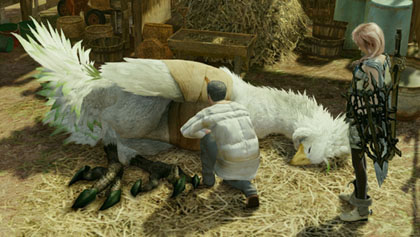 Click For the Full Picture Archive
Click For the Full Picture ArchiveDon't get me wrong, I enjoyed many of the side missions. Sure, too many of them are MMO-style fetch quests, but there are also a lot of interesting characters to meet and I certainly like the idea of completing one last task to save their soul. My problem isn't with the concept, but rather how tonally different it is compared to the gravity of the main story. With only hours left before the world comes to an end, I found myself struggling to care about the plight of the little girl that lost her teddy bear.
Lightning is positioned as a Jesus Christ character, returning to the planet during end times to save the souls of humanity. The parallels to real world religion are not coincidental, though far enough removed to not anger any specific group. I couldn't help but wonder if this would be the fate of any returning savior. If Jesus Christ were to actually come back to Earth, would he be stuck running fetch quests for lazy farmers?
To her credit, Lightning isn't especially thrilled about meeting the citizens of Nova Chrysalia. Then again, she's not exactly thrilled about anything else. The Lightning that has returned is near emotionless; unable to remember the feelings she had centuries ago. She comes off like a disaffected teenage girl, ready to say "meh" after every important comment. At times it sounds like MTV's Daria doing her best Solid Snake impression. It's actually kind of wonderful.
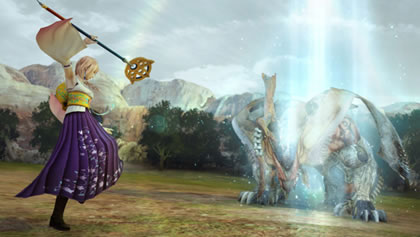 Click For the Full Picture Archive
Click For the Full Picture ArchiveWith all this talk about the end of the world and people to save, it's easy to overlook the huge changes that have come to combat mechanics. Although you only play as Lightning, that doesn't mean this Final Fantasy has completely ditched the party system. Instead of choosing different characters, Lightning switches between three different types of "Schemata." That is, three different outfits customized with different weapons, shields and special attacks.
Although it has a silly name, this new set-up is actually pretty simple. Players will collect dozens of different outfits, each with its own unique set of attributes and abilities. One dress may be good at fire attacks, while a soldier's uniform may give Lightning an advantage with melee hits. With so many different outfits, it's easy to make a number of different schemata configurations for different types of enemies and encounters. But remember, even though you can create multiple variations, Lightning is only able to take three into battle.
On top of equipping weapons and armor to the schemata, Lightning is also able to assign different attacks to the four face buttons. Normally one button is reserved for a defensive position, but the other three can range from magic spells to melee attacks. With only four slots per schemata, players will have a total of twelve attacks in any given battle. And don't get too excited, because you may not even have twelve slots to assign. Most outfits have at least one assigned attack, which cannot be moved or replaced. This is where customizing you schemata can get real tricky.
In battle, Lightning is able to switch between outfits at the push of a button. This means that you will be able to quickly move from one schemata to the next, throwing different types of magic and powerful attacks at your foe. Although you only play as Lightning, these unique outfits feel like different characters. I thought I was going to miss the traditional party system found in old Final Fantasy games, but constantly changing wardrobes ended up scratching the same itch.
Forget the turn-based combat of yesteryear, this Final Fantasy XIII sequel has each fight play out in real time. Lightning is able to walk all around the enclosed combat arena, plotting her next move and avoiding enemy fire. The player is also responsible for blocking, which is normally mapped to one of the four face buttons. There's even a timing mechanic for blocking enemy attacks. If you hit the button at just the right time, Lightning will avoid taking any damage. All these changes make the combat much more exciting and interactive.
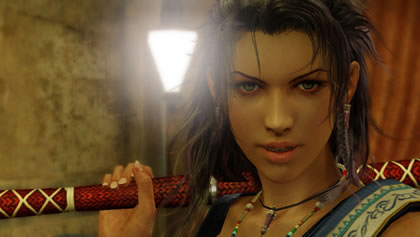 Click For the Full Picture Archive
Click For the Full Picture ArchiveAnd just to add another wrinkle to the gameplay, Final Fantasy XIII-3 introduces EP abilities. Throughout the 25 hour adventure, Lightning will earn a number of different EP moves, including the ability to escape all battles, a healing spell, an earthquake attack and even a decoy that confuses your opponents for a short time. Many of these abilities are meant to be used in battle, though a few of them are useful when just running around the maps. For example, you can spend EP to teleport to a different region, or even stop the countdown timer for a few minutes.
None of this is especially original on its face, but the way it's handled is certainly unique. EP abilities not only use a separate gauge than other attacks, but it also requires you to pause the game. It's just another example of how everything in Lightning Returns is a little different than what you're expecting.
Even with all these changes, Lightning Returns won't let you forget that this is the final chapter in a trilogy. Although there are a lot of great videos and resources for people who want to catch up, this sequel is intended for people who played through the first two chapters of Final Fantasy XIII. This finale doesn't work as a standalone game, but perhaps that's expecting too much from trilogy steeped in so much convoluted mythology.
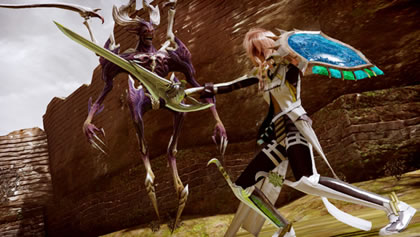 Click For the Full Picture Archive
Click For the Full Picture ArchiveSpeaking of expecting too much, I found myself constantly disappointed with the game's visuals. Don't get me wrong, the many cinema scenes are absolutely breathtaking. Sadly, the in-game graphics aren't able to keep up. Lightning manages to look good, but there's something about the way the world looks that feels dated. Many of Nova Chrysalia's citizens are blocky and lacking detail. On the other hand, the fights look unbelievable. The presentation is a bit of a mixed bag.
Thanks to some fundamental changes and all the side quests, Lightning Returns is the first Final Fantasy game to offer real replay value. Chances are you won't be able to tackle every single mission your first time through, so take your gear and try the harder difficulties.
Lightning Returns is a fitting end to an epic trilogy. While it is a little messy and tonally all over the place, Final Fantasy XIII-3 manages to come up with a number of intriguing ideas. Not only does Lightning Returns stick the landing, but it may improve your opinions of the first two chapters. Although it's far from perfect, fans of the series will be satisfied with this emotional finale.
HOME |
CONTACT |
NOW HIRING |
WHAT IS DEFUNCT GAMES? |
NINTENDO SWITCH ONLINE |
RETRO-BIT PUBLISHING
Retro-Bit |
Switch Planet |
The Halcyon Show |
Same Name, Different Game |
Dragnix |
Press the Buttons
Game Zone Online | Hardcore Gamer | The Dreamcast Junkyard | Video Game Blogger
Dr Strife | Games For Lunch | Mondo Cool Cast | Boxed Pixels | Sega CD Universe | Gaming Trend
Game Zone Online | Hardcore Gamer | The Dreamcast Junkyard | Video Game Blogger
Dr Strife | Games For Lunch | Mondo Cool Cast | Boxed Pixels | Sega CD Universe | Gaming Trend
Copyright © 2001-2025 Defunct Games
All rights reserved. All trademarks are properties of their respective owners.
All rights reserved. All trademarks are properties of their respective owners.





























